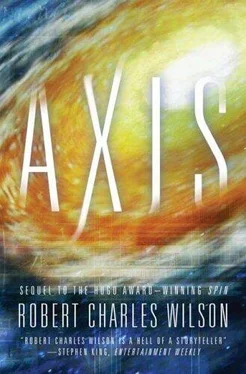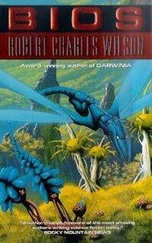The most spectacular success story of the Spin had been the terra-forming and colonization of Mars. Using the expanding sun and the passage of millions of years in the external solar system as a kind of temporal lever, Mars had been rendered at least marginally habitable and seed colonies of human beings had been established there. While a scant few years passed on Earth behind its Spin membrane, civilizations on Mars had risen and fallen.
(Even those bare facts—unmentionable in the presence of Lise's mother, who had lost her parents to the dislocations of the Spin and would brook no discussion of it—had raised the hackles on Lise's neck. She had learned all this in school, of course, but without the attendant sense of awe. In Robert Adams' hushed discourse the numbers had not been just numbers: When he said a million years she could hear the distant roar of mountains rising from the sea.)
A vastly old and vastly strange human civilization had arisen on Mars during the time it took, on the enclosed Earth, for Lise to walk to school and back.
That civilization had been wrapped by the Hypotheticals in its own envelope of slow time—an enclosure that brought Mars into synchronization with the Earth and ended when the Earths enclosure ended. But before that happened, the Martians had sent a manned spacecraft to Earth. Its sole occupant had been Wun Ngo Wen, the so-called Martian Ambassador.
Lise would ask—they had this conversation on more than one starry summer night—"Did you ever meet him?"
"No." Wun had been killed in a roadside attack during the worst years of the Spin. "But I watched his address to the United Nations. He seemed… likable."
(Lise had seen historical footage of Wun Ngo Wen from an early age. As a child she had imagined having him for a friend: a sort of intellectual Munchkin, no taller than herself.)
But the Martians had been coy from the beginning, her father told her. They had given the Earth their Archives, a compendium of their knowledge of the physical sciences, in some areas more advanced than earthly science. But it said very little about their work in human biology—the work that had produced their caste of long-lived Fourths—or about the Hypothetical. To Lise's father these were unforgivable omissions. "They've known about the Hypothetical for hundreds if not thousands of years," he said. "They must have had something to say, even if it was only speculation."
When the Spin ended, and both Earth and Mars were restored to the customary flow of time, radio communication with the Martians had flourished for a time. There had even been a second Martian expedition to Earth, more ambitious than the first, and a group of Martian legates had been installed in a fortresslike building attached to the old United Nations complex in New York—the Martian Embassy, it came to be called. When their scheduled five-year tenure expired, they were returned home aboard a terrestrial spacecraft jointly engineered by the major industrial powers and launched from Xichang.
There was never a second delegation. Plans to send a reciprocal terrestrial expedition to Mars broke down in multinational negotiations, and in any case the Martians had shown little enthusiasm for it. "I suspect," Lise's father said, "they were a little bit appalled by us." Mars had never been a resource-rich world, even after the ecopoeisis, and its civilization had survived through a sort of meticulous collective parsimony. Earth—with its vast but polluted bodies of water, its inefficient industries and collapsing ecosystems—would have horrified the visitors. "They must have been glad," Robert Adams said, "to put a few million miles between them and us."
And they had their own post-Spin crises to deal with. The Hypothetical had also installed an Arch on Mars. It rose above the equatorial desert, and it opened on a similar small, rocky planet, hospitable but uninhabited, orbiting a distant star.
Communications between Earth and Mars had slowed to a perfunctory trickle.
And there were no more Martians on Earth. They had all gone home when the diplomatic mission ended. Lise had never heard otherwise.
So how could Sulean Moi be a Martian?
* * * * *
"She doesn't even look like a Martian," Lise said. Martians were four to five feet tall at most and their skin was deeply ridged and wrinkled. Sulean Moi, as she appeared in the original snapshot from her father's house in Port Magellan, had been only ordinarily short and not especially wrinkly.
"Sulean Moi has a unique history," Diane said. "As you might imagine. Would you like a cold drink? I think I would—my throat's a little dry."
"I'll fetch," Turk said.
"Fine. Thank you. As to Sulean Moi… I'm afraid I have to tell you something about myself before I can explain." She hesitated and closed her eyes briefly. "My husband was Tyler Dupree. My brother was Jason Lawton."
A second passed before Lise placed the names. They were names out of history books, Spin-era names. Jason Lawton was the man who had helped seed the barren deserts of Mars, the man who had set the replicator launches in motion, the man to whom Wun Ngo Wen had entrusted his collection of Martian pharmaceuticals. It was Jason Lawton who had defied the U.S. government by distributing those drugs, and the techniques for reproducing them, among a scattered group of academics and scientists who would become the first Terrestrial Fourths.
And Tyler Dupree, if she recalled correctly, had been Jason Lawton's personal physician.
"Is that possible?" Lise whispered.
"I'm not trying to impress you with my age," Diane said. "Just establish my credentials. I'm a Fourth, of course, and I've been a part of that community since its inception. That's why Sulean Moi came to see me, a few months ago."
"But—if she's a Martian, how did she get here? Why doesn't she look like a Martian?"
"She was born on Mars. When she was very young she nearly died in a catastrophic flood—she suffered injuries, including tissue death in the brain, that could only be treated by a radical reconstruction using the same drugs that extend life. Given at such an early age, the treatment has a rather dire side effect—a sort of genetic recidivism. She never acquired the wrinkles most Martians develop at puberty and she continued growing past the point at which they ordinarily stop. Which left her looking almost like an Earthling—a throwback, as they would have seen it, to her earliest ancestors. Because she lost most of her immediate family, and because she was considered grotesquely deformed, she was raised by a community of ascetic Fourths. They gave her an impeccable education, if nothing else. No doubt because of her appearance, she was fascinated by Earth and devoted herself to scholarship in what we would call 'Terrestrial Studies'—I have no idea what the Martians called it."
"An expert on Earth," Lise said.
"Which was why, eventually, she was selected as one of the Martian legates."
"If that's true, her photograph would have been everywhere."
"She was kept away from the press. Her existence was a carefully guarded secret. Do you understand why?"
"Well—if she looked so much like an Earthling—"
"She could pass unnoticed in a crowd and she had taught herself to speak at least three terrestrial languages like a native."
"So she was what, a spy?"
"Not exactly. The Martians knew there were Fourths on Earth. Sulean Moi was their diplomatic mission to us."
Turk handed out glasses of ice water. Lise sipped eagerly—her throat was dry.
"And when the Martians left," Diane said, "Sulean Moi chose to stay behind. She traded places with a woman, a Terrestrial Fourth who happened to resemble her. When the legation went back to Mars that woman went with them—our own secret ambassador, in a way."
Читать дальше












